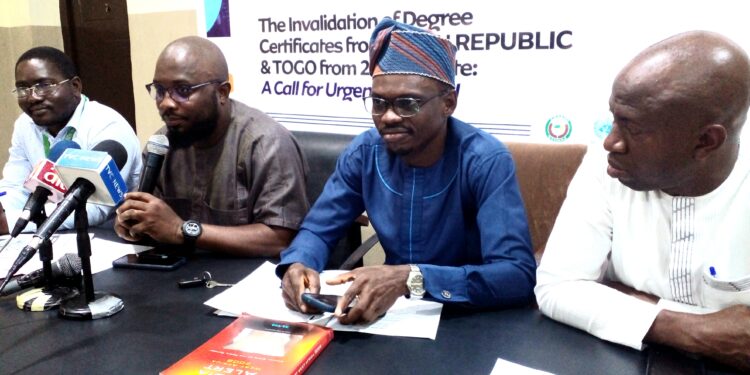Stakeholders from Benin, Togo storm Nigeria over certificates ban saga
*As coalition says govt's 'fake degree certificates' claim false

By BASHIR ADEFAKA
Addressing journalists during the Lagos world press conference, Mr. Gabriel Kona, President of Nigerian Lecturers in Benin, who also doubles as leader of the Coalition of Stakeholders on Education in the affected countries, clarified that the Group is not opposing the Nigerian government’s efforts to sanitize the education system in Benin, Togo, and Nigeria.
The DEFENDER reports that some African people of interest under the name, “Coalition of Stakeholders in Education (CSE) in Benin and Togo Republics”, took their battle to the Nigerian soil during which they provided to the public world’s most populous black nation the nitty-gritty that is the basic facts about the information being spread across the length and breadth of their land by authorities in the country.

In what appears to be its laying credence an investigated report by The DEFENDER titled, “{INVESTIGATIONS} The half-truth, politics of Nigerian Minister’s declaration on citizens studying in Benin, Togo”, published on August 26, 2024, the Coalition told a world press conference held in Lagos on Tuesday September 3, 2024 that Nigerian government was being untruth with what it fed its citizens with.
At the event, the CSE, a group comprising lecturers, students, alumni, school owners, and parents as well as guardians, among others of particularly private universities in Benin Republic and Togo, debunked the government’s claim that listed five and three universities in Benin and Togo, respectively, as the only universities accredited to run degree programmes.
It did not just debunked the government’s claim but also went a step further to provide proofs to substantiate the fact it brought along with it that Republic of Benin alone has no fewer than 103 accredited universities (comprising eight public and 95 privately owned institutions) that are recognized by the host country. Similarly, it said, Togo has over 40 universities that are not only recognized by accredited to run degree programmes.
They noted that the lists of all accredited universities in both countries are publicly available on the websites of their respective Ministries of Education and Scientific Research and, by way of emphasis, refuted the Nigerian government’s claim that only five universities in Benin and three in Togo are legitimate, while others are operating illegally. The coalition described this claim as completely false.
The group added by revealing that the lists were also provided to Nigeria’s inter-ministerial committee that visited Benin earlier this year (January 2024).
The coalition questioned why Nigeria’s Minister of Education, Prof. Tahir Mamman, would provide incorrect information about the true state of university education in Benin and Togo to the Nigerian public.
Parents and other stakeholders, at the event, said they had to seek better alternatives within the legal means outside Nigeria saying they knew that their children received quality and lawful education and that the degree certificates they obtained from the neighbouring countries’ universities they attended are not fake. “They are legal and authentic”.
The DEFENDER recalls that the decision of the Nigerian Minister of Education to announce invalidation of degree certificate from 2017 to date, obtained from Benin and Togo, was based on recommendation of a committee set up by the Federal Government to investigate degree certificate racketeering by Nigerian students in the two Francophone countries.
The decision, if implemented, will affect all Nigerian graduates from the last seven years who obtained the affected countries and whose certificates are currently being used for employment in both public and private sectors in Nigeria and which, if invalidated, would lead to huge losses in terms of job amidst hunger and hunger already ravaging lives of both the high and the low classes in a country that is self-pride as largest economy in Africa.
Addressing journalists during the Lagos world press conference, Mr. Gabriel Kona, President of Nigerian Lecturers in Benin, who also doubles as leader of the Coalition of Stakeholders on Education in the affected countries, clarified that the Group is not opposing the Nigerian government’s efforts to sanitize the education system in Benin, Togo and Nigeria.
However, he stressed that innocent individuals should not be punished. He insisted that the quality of university education in Benin and Togo is comparable to that in Nigeria and other parts of the world.
He also expressed surprise that the Nigerian government has not made public the details of its findings on the alleged certificate scam.
Kona argued that making the findings public would help stakeholders identify the implicated institutions and officials and apply appropriate punishments, rather than penalizing all Nigerians with degrees from those countries.
He described the Federal Government’s pronouncement on the matter as unjustifiable, noting that the majority are now suffering for the actions of a negligible few.
“As we speak, parents, students, and alumni members of these affected universities, who are of Nigerian descent, are agonizing and confused about their fate,” he said.
Kona vouched for Nigerians holding degrees from Benin and Togo, asserting that they obtained their certificates legally and are excelling in their various endeavors.
He called on the Federal Government, especially President Bola Tinubu, to review the matter and revoke the ban in the interest of fairness and equity.
Also speaking at the event, Mr. Abiola Daramola, a representative of parents/guardians of Nigerian students in Benin, expressed surprise at the Federal Ministry of Education’s stance.
He pointed out that the same ministry had provided them with a list of approved universities in Benin and Togo when their children were seeking admission and had evaluated their certificates upon completion of their courses for a fee.
He urged the government to reverse its decision and revalidate the banned certificates.
Daramola emphasized that the issue is not just about the financial investment in their children’s education, but also about the effort, energy, risk, and time committed to their studies in a foreign land.
Some of the affected students and alumni, including Silas Jimi, who studied Computer Science at Estan University, Cotonou, expressed their displeasure with the development, stating that they are now confused about their future.
They explained that they studied in Benin and Togo legally and spent the required number of years to earn their certificates.
They appealed to the Federal Government to reconsider its stance on their certificates.









